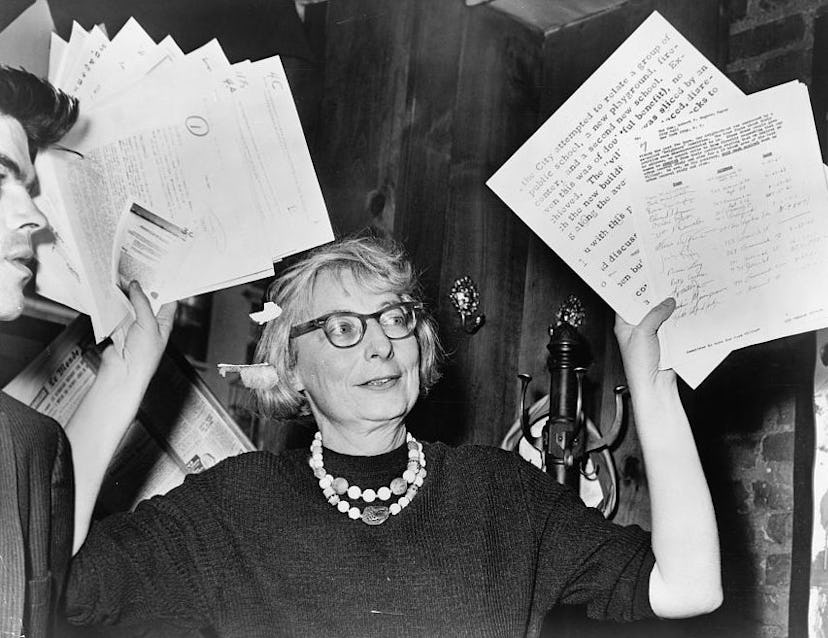The Untold Story of Citizen Jane Jacobs, Who Got Herself Arrested to Save New York
A new documentary by Matt Tyrnauer sheds light on the woman who fought — and won — against an egomaniac builder. What tale could be more timely?

The maze of the West Village, the bustle of Washington Square Park, and the shops and lofts rising up above Soho’s streets — all are now hallmarks of downtown New York, favored by tourists and locals alike. But they also have something else in common. All were on the verge of being destroyed by the government as part of its “urban renewal” efforts just decades ago, had it not been for the efforts of one woman: Jane Jacobs, an outspoken activist and one of the only women on par with figures like Le Corbusier in architecture’s historically male-dominated sphere.
All that, though, has barely been acknowledged until this year. One hundred years after her birth, Jacobs is currently having a moment of sorts, even though she died in 2006. This fall saw the release of two books about her legacy, which came on the heels of an opera about her David and Goliath-like fight with the city planner Robert Moses — a story that’s also at the center of Citizen Jane: Battle for the City, the documentary that kicked off the DOC NYC festival, which just wrapped in New York this week.
The latter is the first-ever film about Jacobs. The project first came about around the same time as her death, when the director Matt Tyrnauer was perusing a bookstore in the Village and purchased a copy of Jacobs’s breakthrough 1961 book, The Death and Life of Great American Cities. “I was blown away,” Tyrnauer recalled. “It made me see New York completely differently.”
A few years later, after making his first feature documentary, 2008’s Valentino: The Last Emperor, she was still on Tyrnauer’s mind. He embarked on a “four-year odyssey” to animate the story of someone who’d already passed away, and whose most vital contributions came at a time when TV was still a nascent medium. And while he did eventually dig up a trove of archival footage, even Jacobs’ undocumented tactics were just as unusual as they were effective, making for voiceover descriptions as compelling as never-before-seen shots of New York’s streets.
Take, for instance, the time Jacobs knew the decision to extend a four-lane Fifth Avenue through the heart of Washington Square Park was minutes from coming down. She sprang into action by startling the hearing’s typist into dropping and breaking her stenotype machine, insisting that without a record, they couldn’t continue with proceedings. Shockingly, it worked, though Jacobs did get arrested — not that she seemed to mind much. At that point, the likes of Eleanor Roosevelt spoke out on her side, which embraced the chaos of the city and championed the importance of the people and their streets.
Jane Jacobs and architect Philip Johnson picketing outside of Penn Station to protest its demolition.
Those philosophies might be common sense now, but were radical enough to earn Jacobs vitriol at the time, along with plenty of sexist critiques. To many, Jacobs — a journalist who wrote about economics, and went on to publish eight more books — was simply a glorified housewife, and to Moses, her causes, like the streets of Harlem, were not meccas of diversity but “cancerous growths” to be excised. Highways, high rises, housing projects, and super-blocks were much more up his speed — modernist ideas that made for satisfyingly tidy city plans on paper, but were a nightmare on the ground, segregating cities and driving communities into poverty.
Of course, Moses isn’t the only power-hungry real estate figure whose often discriminatory generalizations have made their way into American history. “Frankly, we thought that the film would be coming out in a world where we’d have the first woman president of the United States,” Tyrnauer said of Citizen Jane’s impending widespread release through Sundance Selects on April 21, when Donald Trump will be a few months into his presidency.
But the election’s unexpected results have only made Tyrnauer and Jacobs’ activism-leaning message all the more timely. “Jane Jacobs is one of the greatest examples in our history of someone who made their voice heard very effectively against tremendous odds, and against a very male-entrenched, seemingly invincible authority,” Tyrnauer said. “If you want to be an activist and help change your own city, Jane Jacobs is a great place to start.”